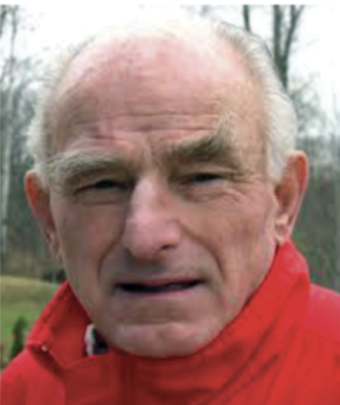Marty Hall - Nordic innovator, double hall of famer
Martin “Marty” Hall, pioneering cross-country coach and innovator, passed away on February 25, 2025, after a short illness. He was 87.
Born in Pennsylvania, Hall moved to Gilford, New Hampshire, when he was eight. His family helped found the influential Gilford Outing Club, which yielded several Olympians. Hall developed into an accomplished athlete and four-event skier at the University of New Hampshire, where he raced for four years, serving as team captain for two. He later served two years in the U.S. Army and competed on the national biathlon team.
Hall became the leading cross-country coach with the U.S. Eastern Amateur Ski Association in the late 1960s and started his push to improve the sport when he developed a pioneering grooming sled for race courses. He coached the U.S. women’s cross-country team in the late 1960s, which was then a part-time job. In 1973 he became the first paid, full-time U.S. cross-country coach when he took over the men’s team. Three years later, under Hall’s guidance, Bill Koch won silver at the 1976 Innsbruck Winter Games, the first Olympic cross-country medal by the U.S. Then, with Hall’s support, Koch experimented with radical formulas in ski preparation and technique, and introduced skating to the World Cup in 1977; it became its own discipline in 1982.
Creative and fearless, Hall pioneered programs, often with his wife, Kathy, that became standard, including sports medicine and psychology, dryland and on-snow training, race protocols, on-site race support and certification for coaches and officials. Hall helped design the first American Birkebeiner course, with race founder Tony Wise, in 1973 at the Telemark Lodge near Cable, Wisconsin. He was instrumental in bringing the first FIS World Cup cross-country ski race there in 1978.
After leading U.S. efforts through the 1970s, Hall served as chief coach of Cross Country Canada (1981–89) and as director (1989–92). He was a self-employed consultant during the 1990s, designing the 1995 World Championships course at Thunder Bay, Ontario. He also helped introduce the short-course format, which allowed racers to regularly pass through the stadium so that spectators could more easily follow the action. Hall served as a TV broadcast analyst for three world championships in 1995 as well as the 1994 Winter Olympics. He returned to his roots by serving as the head cross-country coach at Bowdoin College from 2000 to 2007.
Hall sparked a controversy at the 1988 Calgary Olympics when he implied that blood doping might have been a reason for the Russian team’s dominant performance; he almost lost his job coaching the Canadian team in the aftermath. He was eventually vindicated when the Russians admitted to the doping years later.
Hall is one of the few individuals who has been inducted into both the U.S. Ski and Snowboard Hall of Fame (class of 2017) and the Canadian Ski Hall of Fame and Museum (class of 2018).

